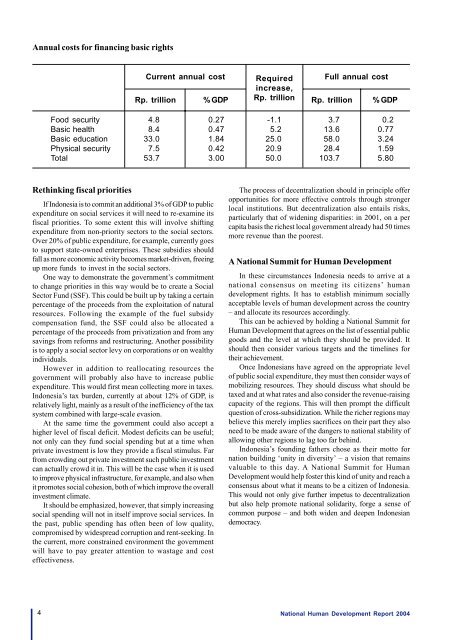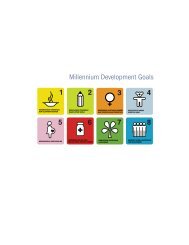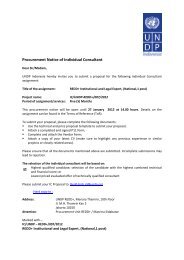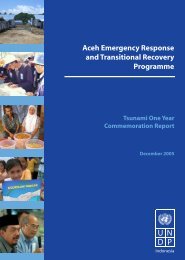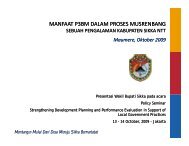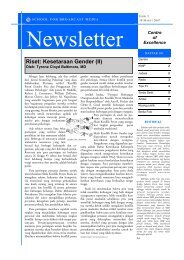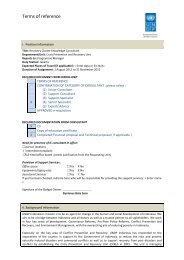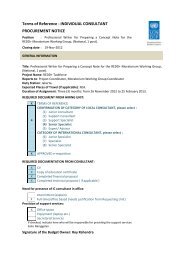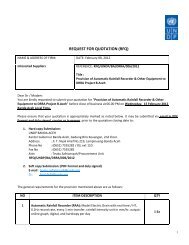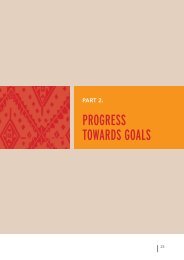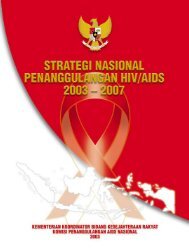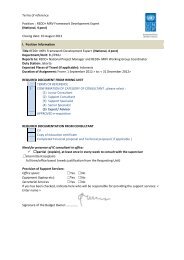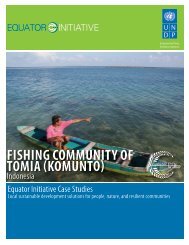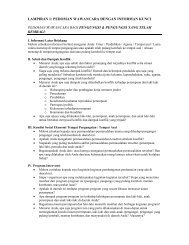Download the Indonesia Human Development Report 2004. - UNDP
Download the Indonesia Human Development Report 2004. - UNDP
Download the Indonesia Human Development Report 2004. - UNDP
Create successful ePaper yourself
Turn your PDF publications into a flip-book with our unique Google optimized e-Paper software.
Annual costs for financing basic rightsCurrent annual costRp. trillion% GDPRequiredincrease,Rp. trillionFull annual costRp. trillion% GDPFood security 4.8 0.27 -1.1 3.7 0.2Basic health 8.4 0.47 5.2 13.6 0.77Basic education 33.0 1.84 25.0 58.0 3.24Physical security 7.5 0.42 20.9 28.4 1.59Total 53.7 3.00 50.0 103.7 5.80Rethinking fiscal prioritiesIf <strong>Indonesia</strong> is to commit an additional 3% of GDP to publicexpenditure on social services it will need to re-examine itsfiscal priorities. To some extent this will involve shiftingexpenditure from non-priority sectors to <strong>the</strong> social sectors.Over 20% of public expenditure, for example, currently goesto support state-owned enterprises. These subsidies shouldfall as more economic activity becomes market-driven, freeingup more funds to invest in <strong>the</strong> social sectors.One way to demonstrate <strong>the</strong> government’s commitmentto change priorities in this way would be to create a SocialSector Fund (SSF). This could be built up by taking a certainpercentage of <strong>the</strong> proceeds from <strong>the</strong> exploitation of naturalresources. Following <strong>the</strong> example of <strong>the</strong> fuel subsidycompensation fund, <strong>the</strong> SSF could also be allocated apercentage of <strong>the</strong> proceeds from privatization and from anysavings from reforms and restructuring. Ano<strong>the</strong>r possibilityis to apply a social sector levy on corporations or on wealthyindividuals.However in addition to reallocating resources <strong>the</strong>government will probably also have to increase publicexpenditure. This would first mean collecting more in taxes.<strong>Indonesia</strong>’s tax burden, currently at about 12% of GDP, isrelatively light, mainly as a result of <strong>the</strong> inefficiency of <strong>the</strong> taxsystem combined with large-scale evasion.At <strong>the</strong> same time <strong>the</strong> government could also accept ahigher level of fiscal deficit. Modest deficits can be useful;not only can <strong>the</strong>y fund social spending but at a time whenprivate investment is low <strong>the</strong>y provide a fiscal stimulus. Farfrom crowding out private investment such public investmentcan actually crowd it in. This will be <strong>the</strong> case when it is usedto improve physical infrastructure, for example, and also whenit promotes social cohesion, both of which improve <strong>the</strong> overallinvestment climate.It should be emphasized, however, that simply increasingsocial spending will not in itself improve social services. In<strong>the</strong> past, public spending has often been of low quality,compromised by widespread corruption and rent-seeking. In<strong>the</strong> current, more constrained environment <strong>the</strong> governmentwill have to pay greater attention to wastage and costeffectiveness.The process of decentralization should in principle offeropportunities for more effective controls through strongerlocal institutions. But decentralization also entails risks,particularly that of widening disparities: in 2001, on a percapita basis <strong>the</strong> richest local government already had 50 timesmore revenue than <strong>the</strong> poorest.A National Summit for <strong>Human</strong> <strong>Development</strong>In <strong>the</strong>se circumstances <strong>Indonesia</strong> needs to arrive at anational consensus on meeting its citizens’ humandevelopment rights. It has to establish minimum sociallyacceptable levels of human development across <strong>the</strong> country– and allocate its resources accordingly.This can be achieved by holding a National Summit for<strong>Human</strong> <strong>Development</strong> that agrees on <strong>the</strong> list of essential publicgoods and <strong>the</strong> level at which <strong>the</strong>y should be provided. Itshould <strong>the</strong>n consider various targets and <strong>the</strong> timelines for<strong>the</strong>ir achievement.Once <strong>Indonesia</strong>ns have agreed on <strong>the</strong> appropriate levelof public social expenditure, <strong>the</strong>y must <strong>the</strong>n consider ways ofmobilizing resources. They should discuss what should betaxed and at what rates and also consider <strong>the</strong> revenue-raisingcapacity of <strong>the</strong> regions. This will <strong>the</strong>n prompt <strong>the</strong> difficultquestion of cross-subsidization. While <strong>the</strong> richer regions maybelieve this merely implies sacrifices on <strong>the</strong>ir part <strong>the</strong>y alsoneed to be made aware of <strong>the</strong> dangers to national stability ofallowing o<strong>the</strong>r regions to lag too far behind.<strong>Indonesia</strong>’s founding fa<strong>the</strong>rs chose as <strong>the</strong>ir motto fornation building ‘unity in diversity’ – a vision that remainsvaluable to this day. A National Summit for <strong>Human</strong><strong>Development</strong> would help foster this kind of unity and reach aconsensus about what it means to be a citizen of <strong>Indonesia</strong>.This would not only give fur<strong>the</strong>r impetus to decentralizationbut also help promote national solidarity, forge a sense ofcommon purpose – and both widen and deepen <strong>Indonesia</strong>ndemocracy.4National <strong>Human</strong> <strong>Development</strong> <strong>Report</strong> 2004


